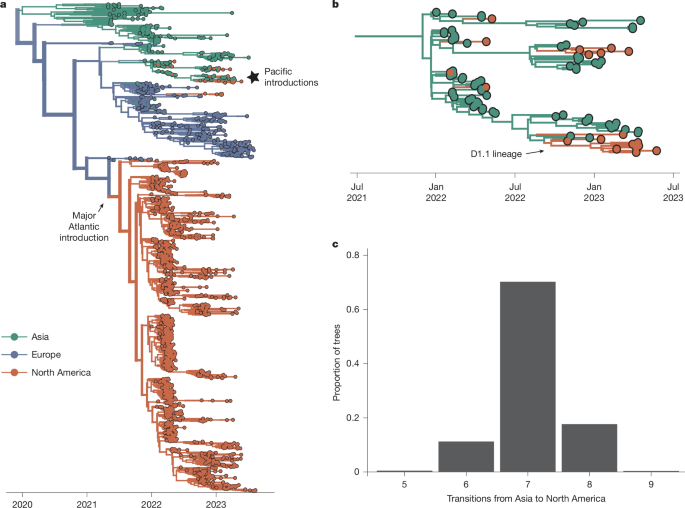Chemistry teacher María Intencipa misses the good old days — last year — when her small school in rural Colombia was sheltered from the artificial intelligence revolution by its remoteness.
José Gregorio Salas Rural High School, where she works, lacks enough computers and reliable internet. Few students can afford the high-end smartphones or data plans that top-of-the-line AI requires.
Intencipa had heard about ChatGPT, but from what she could tell, few of her students were using it. In 2023, some started whispering about getting help from “Lucia.” She thought it might be the name of a tutor, but they were referring to the Luzia app, which turns the WhatsApp messaging app into an AI bot.
Then, last year, AI metastasized to almost every class. Teachers across the school noticed a surge in unusually high-quality answers that didn’t resemble their students’ typical work. Homework and essays suddenly featured erudite arguments, sophisticated vocabulary, and points that had not been taught in class or the textbooks.
“When I assign homework, students just use AI,” Intencipa told Rest of World. “Because it’s easier.”
Despite the burst in brilliance, more kids were failing exams, teachers said.
Starting in July 2024, AI was suddenly everywhere all at once in Latin America after Meta Platforms started incorporating chatbots in its apps across the region. Whether users wanted them or not, Facebook, WhatsApp, and Instagram became homes for a variety of AI bots.
The students of José Gregorio Salas Rural High School put them to work on their homework. This small community of farming and cattle-ranching families was no longer shielded from the AI revolution, which was disrupting education worldwide. It could no longer escape because the new bots were embedded in the apps everyone was already using. Meta had fine-tuned the apps for the emerging-market consumer, making them cheaper to use and designing them to work with less sophisticated phones and patchy connectivity.

ChatGPT, OpenAI’s pioneering generative AI chatbot, is dominant in the U.S., but for many students in Colombia, Meta’s AI upgrades have become the go-to bots. Meta has a controversial agreement with telecommunications companies that restricts some users on cheaper data plans to using specific apps and sites including those from Meta.
Intencipa and other teachers in Colombia are concerned their students will lose years of basic education, as traditional teaching methods are no longer effective.
“Here, Facebook is the king,” Luisa Cárdenas, a social sciences teacher in Quimbaya, in Colombia’s coffee region, told Rest of World. Her students “simply copy what comes up in the chat, but they’re not capable of analyzing what they’re replicating.”
Some even graduate without mastering how to read and write, she said.
Even before this powerful cheating tool arrived, Colombia was facing enormous educational challenges.
Only 54 out of every 100 students complete high school, and of those, just 11 reach acceptable levels in critical reading, mathematics, and natural sciences, according to the Educational Realities Observatory at Icesi University.
Colombian students ranked the worst in creative thinking among countries assessed by the Organisation for Economic Co-operation and Development’s Programme for International Student Assessment.
Students say the shortcut is too tempting and easy to take. It helps them avoid the monotony of unexciting lessons and gain more time to engage with real people, often on the same apps where they encounter bots. “I ask it for everything,” Sergio, a 16-year-old student, told Rest of World. “When they give me an assignment, I just research and copy. I don’t read or anything. Sometimes I’ve wondered if what it’s telling me is true, but it helps me save time.”

A growing body of research suggests the misuse or overuse of AI can harm children.
In April, a report from Common Sense Media, a nonprofit organization that researches and promotes healthier digital environments for young people, stated that AI tools pose “unacceptable risks” for users under 18, as some are designed to foster emotional dependency. The AI tools can also provide dangerous information and sometimes bad advice, the report said.
A June study out of the Massachusetts Institute of Technology suggested that while large language models were helpful in essay writing, reliance on them could reduce cognitive activity.
AI can be a valuable tool for some of the repetitive tasks that overworked teachers are required to perform.
A World Economic Forum report from last year said generative AI can help personalize learning experiences and reduce the time teachers spend on routine tasks, allowing them to dedicate more time to students.
Colombian teachers are utilizing tools like Twinkl and Eduaide.AI to access pre-designed materials and help with chores such as grading and completing forms. Some of them also use ChatGPT or Google’s Gemini for various tasks. This helps lighten the load for teachers who may handle over 100 students weekly across multiple classes. Google runs ads on Facebook and Instagram, promoting its Gemini chatbot as a time-saving tool for teachers and students.
The Colombian government says it promotes safe and gradual use of AI.
A spokesperson from Colombia’s Ministry of Education told Rest of World that in elementary school, AI should be used in a “limited” way and “always accompanied by adults,” while in high school, chatbots can be useful “as long as critical reflection is promoted.”

Colombia’s neighbor, Brazil, has banned the use of cellphones in classrooms. A study by Rio de Janeiro’s city government, conducted after six months without cellphones in schools, found improvements in student participation, performance, and concentration.
Intencipa said she doesn’t need a formal study to know that AI is stunting her students.
“If I give them a research assignment, they look it up there,” she said, referring to the AI bots in Meta’s apps. “If I ask for an opinion, they do the same thing.”
This is forcing teachers to rethink evaluation methods. Traditional assessment approaches based on written assignments must now be reconsidered to accurately gauge whether students genuinely understand concepts, develop skills, and engage in creative thinking, Luisa González-Reiche, an expert in pedagogy and philosophy, told Rest of World.
Educators now spend a significant amount of their time detecting AI-generated work and seeking ways to assess whether students are developing essential skills.
Some turn to AI writing detection tools. Some are administering more oral and hand-written exams. Some ask students to verbally discuss, defend, and describe how they researched their papers.
In Guatavita, a small town near Bogotá, philosophy and religion teacher Byron Giral uses role-playing to encourage engagement.

He chooses a complex, hyperlocal topic that AI is unlikely to be familiar with. He then has students debate, with each acting as the local mayor, company executive, priest, and other stakeholders.
Students work together, laugh, blush, and sometimes get loud, he said, but few are looking at their phones.
“Since it’s an oral exercise, they have to use critical thinking,” Giral told Rest of World. “If I only asked for written work, it would be very difficult to determine that they’re learning.”
Chemistry teacher Intencipa has made the radical decision to abandon a pillar of high school classes for generations: homework.
She makes students do all their study and work in front of her to ensure they respond with their minds.
“Now I keep all my work in the classroom,” she said.
.png)



